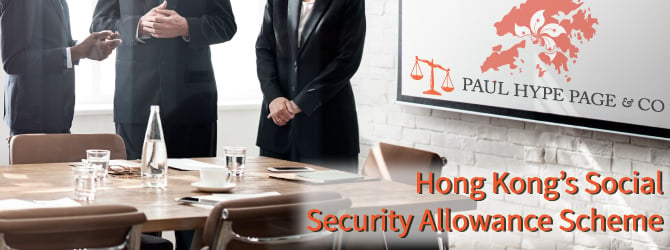Of course, before anyone can begin to gain an understanding of Hong Kong’s professional culture, one must already have relocated to Hong Kong to work there. This is where we at Paul Hype Page & Co. play our role. We will take all the steps necessary to supply you with the Hong Kong visa of your choice. All you have to do is contact us; we will manage everything else for you.
Introductions
In Hong Kong, the most common method of one-to-one introduction includes a light handshake. Usually, this handshake is conducted with the heads of both people involved slightly bowed. Handshakes are to be done with both people standing square to each other. The shoulders and feet of each person must face the other’s. There must be eye contact between both people. The hands are to meet at the web instead of the fingers. An excessively firm handshake is considered a breach of general etiquette as it is deemed to be off-putting for many.
When addressing a person, the full title of the person is to be used before mentioning the person’s surname. It is considered important to say the name of the other person involved during introductions. Should there be a group introduction, the most senior member is to be greeted before the others. Those unsure about each person’s seniority may use titles as a guide to understand who is the most senior in the group.
Physical contact during introductions is to be minimized. Apart from the initial handshake, business introductions in Hong Kong typically have little or no physical contact involved. Any breach of this protocol is viewed in a very negative light.
Although it is not required, those who work in international firms and do not have a Western name are advised to adopt one. Hong Kong is one of the world’s most cosmopolitan business centres. Therefore, people from all corners of the world go there to work and conduct business activities. Thus, it might be of assistance for one to adopt a Western name so that when dealing with international associates, there will not be any difficulties encountered when pronouncing one’s name.
Business Cards
Everyone who works in Hong Kong is encouraged to obtain a business card. This is because business cards facilitate ease of contact with Hong Kong-based employees. There are certain codes of conduct associated with business cards in Hong Kong’s professional culture. During exchanges of business cards in Hong Kong, the cards should be turned and both hands should be used. In this way, the names printed on the cards will face the people who are to receive each card.
Upon receiving a business card, it is expected that both people involved study the details printed on the card. Doing so conveys a level of respect and decorum. When working with clients who are not from Hong Kong, it would be wise to provide a business card with information printed in both English and Chinese. By doing so, one shows respect to the background and culture of the foreigner.
Meetings and Negotiations
Some of the most important facets of Hong Kong’s professional culture are related to the conducting of negotiations and meetings. All appointments must be booked in advance. It does not matter whether the booking is made through mobile phone, email, instant messaging, or even in person. The very fact that the booking is made in advance is the most important point to be considered.
When attending a business meeting in Hong Kong, it is of much important that one be ready for the meeting by preparing all relevant statistics and figures. Most business meetings in Hong Kong place much emphasis on hard information and statistics. Therefore, preparing such items ahead of time will leave a positive impression on clients.
When one undergoes negotiations with a client who is based in Hong Kong, one must select one’s words in such a way to leave a positive impression. Traits such as mutual respect and diplomacy are highly prized in Hong Kong. Thus, those who can display such traits when negotiating will find that clients are more willing to agree to a certain point when portraying these traits.
It is important to consider the time of year during which a meeting is to be scheduled. It is not advisable to schedule any meetings during times of the year in which there are one or more days which are public holidays. This is because it is likely that many people within the company in question will not be present. Some will be away to visit family members. Others will take the opportunity to travel. Either way, there are much more suitable periods during which meetings could be held.
Dress Code
In any workplace in Hong Kong, just as in any workplace elsewhere, all employees and visitors are to adhere to the company’s dress code. Of course, not all workplaces in Hong Kong will have the same dress code. However, the majority of them will possess certain similarities.
Most workplaces in Hong Kong require their male employees to wear dress shoes and long-sleeved shirts. Female employees are usually required to wear knee-length skirts or dresses; their shoulders are normally to be covered as well. Accessories are typically permitted as long as they are not deemed to be excessive. During certain occasions such as official business events or meetings, however, formal wear will be required.
The colour of one’s clothing is also a relevant point. In Hong Kong’s culture, each colour bears a specific meaning. For this reason, the message sent by two similar pieces of clothing might be very different if they are of different colours. Therefore, one must select clothing of an appropriate colour when working in Hong Kong.
Giving and Receiving Gifts
There are certain ways in which the giving of gifts differs within Hong Kong’s professional sphere when compared to its everyday sphere. The giving of gifts to business associates is to be done similarly to the exchange of business cards. Both hands are to be used. The giver and recipient must also be facing each other.
Unlike the giving of gifts to family members or friends, one must be certain to leave the gift in the bag from the store when giving a gift to a business associate in Hong Kong. This is because many people in Hong Kong are brand-conscious. Thus, when giving a gift in a public setting, the brand of the gift should be visible.
Certain gifts should not be given in Hong Kong because of prevailing negative beliefs towards such gifts. Among the items which should not be given as gifts are clocks and watches, sharp objects, blankets, and handkerchiefs. Any object which is blue, white, or black is also discouraged from being given as a gift. All gifts are to be carefully and thoroughly wrapped before being given.
When receiving a gift within the professional sphere in Hong Kong, one must not unwrap it at once. This is because doing so signifies greed and impatience on the part of the recipient. It is also deemed to be impolite to accept a gift on the first offer. One should reject it before having it offered for a second time. At this point, it is acceptable to receive the gift.
Conclusion
The professional culture of Hong Kong is full of complexities and specific details which must be understood by all workers. Anyone who fails to do so runs the risk of offending anyone who associates with the person’s company. This in turn might cause the company’s public image and reputation to suffer and thus reduce its capability to prosper in Hong Kong’s business environment.
Therefore, when a person truly understands how to interpret social cues and thus becomes fully integrated into Hong Kong’s business culture, the person and the company involved will benefit. Those who understand the culture and ways of life in Hong Kong will gain standing among their professional peers. Companies which employ such people, meanwhile, will be able to build up their reputations as companies which truly understand life and culture in Hong Kong.
On that note, perhaps you might be interested in starting a company of your own in Hong Kong. If you are, we at Paul Hype Page & Co. will set you on the path towards doing so. We will work with you throughout the company incorporation process. We will also contact the authorities on your behalf whenever necessary so that your burden will be eased.








